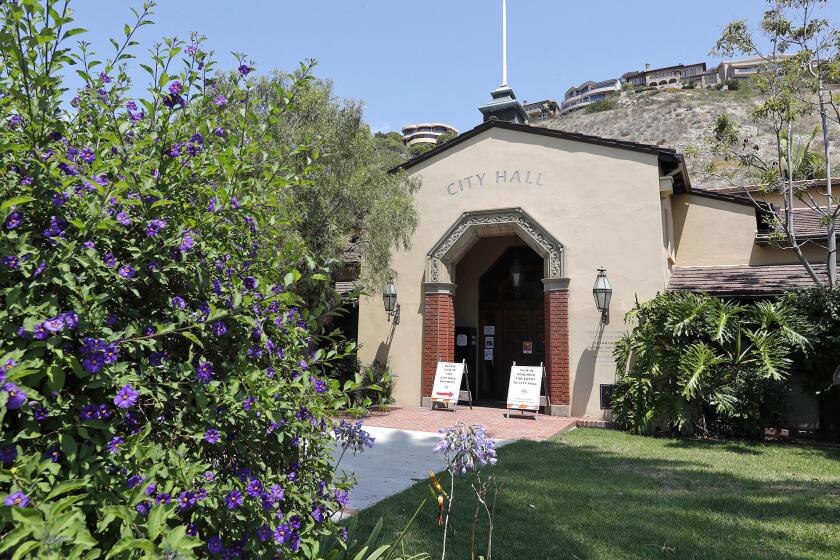Ex-local finds pot of gold in Ojai
- Share via
Gail Davis
Aside from those who have a passion for cookie jars, most Costa Mesa
residents probably don’t remember much about Joe Pelka.
The self-proclaimed potter says he was never appreciated much in this
area for his artistic endeavors.
So eight years ago, he and his wife packed their bags and moved from
Costa Mesa to Ojai, the sleepy little art colony in Ventura County.
That’s when something clicked, he said. The atmosphere was different.
People started buying his work.
“The attitude in Orange County was: potter ... bum,” he said. “But
here, the community supports artists. If you’re a potter, they like you.
The Chamber of Commerce wants you to be a member.”
Pelka’s work is on display at the Ojai Valley Museum through July 30,
along with nature prints by F.G. Hochberg of Santa Barbara.
The vases, mostly with koi themes, have earned Pelka a spot at some of
the West Coast’s top juried arts festivals, and sell for $160 to $1,000
apiece.
Pelka said he developed his trade as a potter by throwing rocks at
fish.
Not pottery shards, he says. It wasn’t artistic frustration.
They were just rocks and he was a kid. He loved koi, the elegant big
brothers to common goldfish, and spent countless hours at a koi farm near
his Orange County home, throwing pebbles into the corners of the fish
ponds.
The koi would race to the rocks, expecting food.
Pelka was fascinated by their grace as they slipped through the water
in chorus.
His work today is a far cry from his first professional work with
ceramics: glazing cookie jars in Costa Mesa. Pelka says he still can’t
believe his good fortune to build a career by creating what he likes:
koi.
“It’s ‘trust your instincts,’ ” he said.
Instinct and success didn’t always go hand in hand.
Pottery first became a passion for him in a high school ceramics
class. He expanded his skills through ceramics classes at a junior
college, which opened the door to the cookie jar job -- hardly the
artistic life he envisioned, but it paid the bills, Pelka said.
Meanwhile, he continued classes at the junior college and recalls an
assignment that formed the basis for most of his work.
He was assigned to make an exact replica of a utilitarian water jug,
with clay of the same chemical makeup of the original, and fired to
produce the same end-product.
Next, the instructor had him create a pot slightly varied from the
original, then a pot slightly varied from that, and on and on, further
from the original.
“I continue to do that; it’s a great assignment,” Pelka said. “You’ve
got a base that’s legitimate, you learn that clay’s got certain
properties and that you’ve got to play by the rules.”
The assignment taught him to be creative, he said, but still to stay
true to the classic, utilitarian function of pottery. Important lesson,
but his pots still didn’t sell and the day jobs continued: From cookie
jar glazer he switched to drill operator at an aircraft plant, then a
cabinetmaker, but kept making ceramics on the side.
Almost three years ago, he gave up his job as a cabinetmaker to make
ceramics full-time. His wife handles the business side of his studio,
freeing him to spend more time at his craft, he said, which has made even
more of a difference.
In the past two years, his work has evolved from small pieces in muted
tones, to elegant, vividly colored vases of all sizes -- some with flying
anemone-like extensions just below the lip, faintly reminiscent of jug
handles.
He said he enjoys experimenting, and one recent venture, on display at
the museum, is a 2-foot-tall garden mural of koi, framed in a black,
polished wood frame.
“The cabinetmaking has come in handy,” he said.
All the latest on Orange County from Orange County.
Get our free TimesOC newsletter.
You may occasionally receive promotional content from the Daily Pilot.



